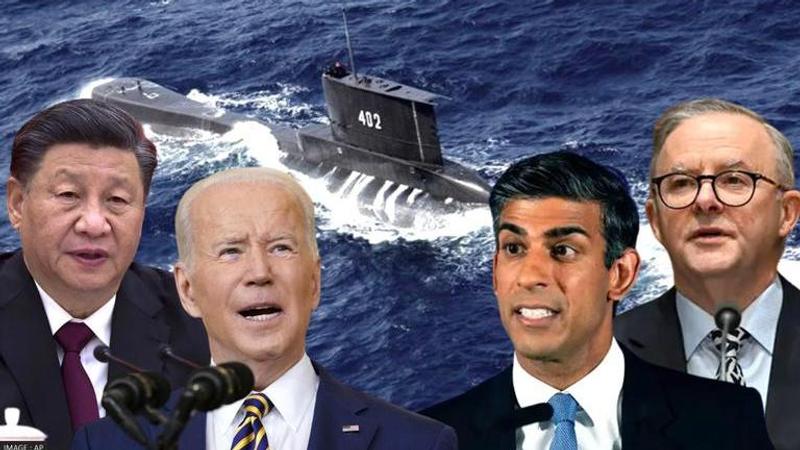Published 18:40 IST, March 9th 2023
AUKUS pact 'poses a serious risk of spread of nuke weapons', warns China amid arms race
AUKUS defence alliance was signed in September 2021 in a bid to confront strategic tensions in the Indo-Pacific where China-US rivalry has been rife over years.

Advertisement
China on Thursday warned that the trilateral AUKUS pact involving Australia, the United Kingdom and the United States under which Canberra is slated to purchase at least five US Virginia class nuclear-powered submarines by 2030s poses a threat to nuclear weapons proliferation. Speaking at a briefing, Chinese Foreign Ministry Spokeswoman Mao Ning said that the nuclear-powered submarines to replace outdated Collins-class diesel-electric subs will trigger a nuke race, destabilizing the Indo-Pacific region.
China's remark comes as US President Joe Biden is set to host the leaders of Australia and Britain in San Diego to chart a way forward for procurement of the nuclear-powered submarines and other high-tech weaponry for Canberra.
"China believes that cooperation between the three countries [Australia, Great Britain and the United States] poses a serious risk of the spread of nuclear weapons, exerts influence on the international system of nuclear non-proliferation and encourages an arms race," Foreign Minister Spokeswoman Mao Ning said.
'Give up the cold war mentality': China on AUKUS
Beijing urged Australia, and its allies Canada and the United States to give up "the cold war mentality," and instead push for peace and stability in the region instead of establishing the exclusionary blocs. The Chinese Foreign Ministry had also earlier derided the pact, saying that such agreements are "extremely irresponsible" and "narrow-minded" as such efforts are viewed as a direct target of China's regional influence in the contested South China Sea.
Australia announced that it is modernizing its submarine fleet before 2038 and that the first nuclear-powered submarine will be built and acquired within the framework of the AUKUS pact to bolster security and contain Chinese PLA's growing military assertiveness in the Indo-Pacific region and South China Sea. Tensions in the region are at an all-time high as it is a flashpoint between the US-China and the allies of Washington.
The AUKUS alliance will prove to be "severely damaging regional peace and intensifying the arms race," China's foreign ministry spokesman Zhao Lijian had also earlier warned, commenting on the US-UK-Australia trilateral defence partnership that snubbed France. Lijian derided "the obsolete Cold War mentality" of the US and its allies, all the while warning that countries, allies to Washington, were, in fact, "hurting their own interests". Australia had now "turned itself into an adversary of China," the Chinese government's mouthpiece Global Times declared.
Credit: AP
Breach of IAEA, NPT
AUKUS defence alliance was signed in September 2021 in a bid to confront strategic tensions in the Indo-Pacific where China-US rivalry has been rife over years due to China's belligerence against smaller island nations. China had also previously argued that AUKUS initiative was in violation of the Nuclear Non-Proliferation Treaty [NPT]. Increasingly angry China also attempted to pass a resolution at an IAEA summit in Vienna from September 26 to 30 in 2022. Sources, however, later claimed that China had withdrawn the resolution after India assumed an "objective view" of the matter.
“China has withdrawn a draft resolution at the International Atomic Energy Agency (IAEA) against the AUKUS grouping seeking to provide Australia with nuclear-powered submarines following India’s objective view on the issue,” Beijing's Foreign Ministry later announced. Meanwhile Indian Mission to the IAEA in Vienna noted that its officials "worked closely" with many IAEA member states in this regard. India's what was described as the "deft and impactful" diplomacy was hailed by the IAEA.
"India's considered role helped many smaller countries take a clear stand on the Chinese proposal. Realising that its resolution would not get majority support, China withdrew its draft resolution," Indian Mission to the IAEA said.
Updated 18:40 IST, March 9th 2023





